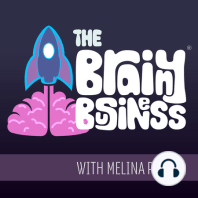48 min listen

95. Hate Being on Camera? Understand Your Brain’s Biases To Change Your Mind
FromThe Brainy Business | Understanding the Psychology of Why People Buy | Behavioral Economics
95. Hate Being on Camera? Understand Your Brain’s Biases To Change Your Mind
FromThe Brainy Business | Understanding the Psychology of Why People Buy | Behavioral Economics
ratings:
Length:
38 minutes
Released:
Apr 10, 2020
Format:
Podcast episode
Description
There used to be a time when people who were camera shy could mostly avoid being in photos or on video. For better or worse...those days are long gone. A lot of us hate seeing ourselves on camera, and today I’m going to talk about why. Our brains are actually programmed to hate seeing ourselves on camera because of specific biases. I’m going to talk about those biases, how they affect our brain, and give some tips to overcome those biases. In a world of selfies, Instastories and YouTube…it’s hard to not be on camera these days. With the coronavirus pandemic (which I covered in episode 91), the world has been flocking to Zoom, which before the end of February had already added more active users than in all of 2019. In the coronavirus episode, I touched on why the brain is wired to react the way it does during a novel and frightening situation like this, and why we all feel inclined to hoard lots of supplies like toilet paper even when we know that is a bit irrational. Today’s episode gets into concepts like familiarity bias, confirmation bias, and comparisons that are working to make our brains hate seeing and hearing ourselves from the outside looking in. I talk about what we see and hear and what others see and hear. I explain how these biases affect us. I also share my own experiences with these biases, and share seven tips you can use to convince your brain that being on camera, audio, and video isn’t that bad after all. CLICK HERE FOR YOUR FREE DOWNLOAD! Show Notes: [04:32] Not too long ago, any of us who wanted to could pretty much avoid cameras – either video or photos. [08:13] I get it. AND I want to help everyone understand some of the things going on in all our brains that make us less than excited about seeing ourselves on video (or listening to our own voices on a recording) to make it a little easier to do that next one. [08:23] There are a couple of mind tricks conspiring against seeing yourself on camera, including confirmation bias, familiarity bias, and the comparison effect (essentially relativity), and the focusing illusion. [08:55] FAMILIARITY BIAS This is one of those things that is so obvious when you hear it, but not something that people are usually connecting the dots on themselves. [09:19] We see everyone head on, and they see us head-on. The only way we see ourselves is a reflection in the mirror. We actually see the opposite of what everyone else sees. [10:23] This is why our familiarity bias kicks in when we see our image in a photo, and we think that something is off. [10:56] Studies have actually shown people two images – head on and mirror image – to see what people preferred, and it confirmed that friends and partners…everyone else, prefers the “straight on” image of us, and we all prefer our mirror images. [11:13] People could never explain why they didn’t like one and why they preferred the mirror image. The conscious can’t explain it…but the subconscious knows what it is used to looking at. [11:47] Until you train your brain to see your “real face” more, it will not be familiar and it will feel off. This means putting in the effort to be in more pictures and on video and watching yourself. [12:11] Some smart systems like Zoom actually let you choose if you want to be looking at and recording your “real” face or your “mirror image.” (Bonus side note not in the episode - I did a run through of a training using GoToMeeting the day after recording this and saw myself in NOT mirror image for the first time in a while...my brain’s immediate reaction was that it was awful! But I was able to use the tips from the episode to get past it and not make it awkward.) [12:42] Help train your brain to get used to the good stuff of the true you. Our brains dial in WAY too closely on things when we are thinking about them. [13:22] You will be focusing on yourself in a way no one else does. So you have two options. First: train yourself to watch the general image and try not to narrow in on one specific item
Released:
Apr 10, 2020
Format:
Podcast episode
Titles in the series (100)
6. How To Sell From The Stage: Last week, I talked about , you might want to listen to that episode before we dive into today’s episode about how to sell from the stage. Both are built on the same foundation. In the truth about pricing “it’s not about the cookie,” there... by The Brainy Business | Understanding the Psychology of Why People Buy | Behavioral Economics